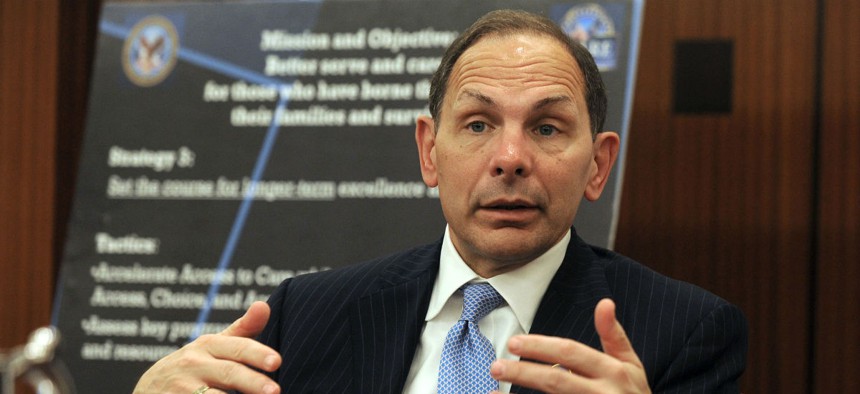
VA Secretary Bob McDonald has expressed concern about the department’s ability to recruit and retain a talented workforce as it recovers from a major scandal. Robert Turtil/VA file photo
VHA Still Needs More Doctors and Nurses
New watchdog report finds that more of the agency’s health care professionals are resigning than retiring.
The Veterans Health Administration continues to struggle mightily to recruit and retain doctors, nurses and psychologists one year after Congress passed legislation designed to better serve veterans, in part by hiring more health care professionals, according to a new inspector general report.
VA’s “largest staffing shortages” were in five occupations: medical officer, nurse, physician assistant, physician therapist and psychologist, the watchdog’s analysis found. The job of medical technologist is another occupation the department has had difficulty filling and keeping people in, according to the report. The jobs of medical officer and nurse were the top two the IG concluded had the largest staffing shortages, followed by the others (physician assistant and psychologist tied for third place, while physician therapist and medical technologist tied for fifth).
The IG defined staffing shortages broadly – not just in terms of filling vacancies or replacing employees.
“In looking at the gains, losses, and changes in onboard staffing for critical need occupations, we found that in the past year, VHA continued to increase the absolute number of staff in critical need occupations,” the watchdog found, on the bright side. “However the net gains are still significantly reduced by high loss rates.”
The report, which Congress required as part of the 2014 Veterans Access, Choice, and Accountability Act, is the third in a series on the agency’s staffing challenges and strategies. The IG findings basically have validated what the department already knew and has been working on improving -- in particular, hiring and retaining more physicians, nurses and mental health professionals to care for an increasing number of Iraq and Afghanistan war veterans. The Choice Act requires VA to report annually on the five occupations with the largest staffing shortages based on the preceding five-years.
The VHA groups “staffing losses” into three categories: voluntary retirements, regrettable losses, and other losses. Regrettable losses are defined “as those individuals who resign from the VA or transfer to another government agency,” the report said. The watchdog found that for each of the professions with the most concerning staffing shortages, a larger percentage of people resigned or left for another agency than retired in fiscal 2015. For example, regrettable losses in the medical officer profession represented 61 percent of the total losses for that occupation in fiscal 2015, 30 percent were because of voluntary retirements and 8 percent for other reasons. “For the other critical need occupations, regrettable losses comprised between 45 and 55 percent of loss, and voluntary retirements ranged between 21 and 46 percent of loss,” the report said.
The department has been hiring new doctors, nurses and clinicians over the past few years as part of a major hiring blitz to fill thousands of critical health care jobs. VA has used its Title 38 authority to offer more competitive pay to doctors and other health care professionals, and is trying to get authority from Congress to move other top management jobs into Title 38 so it has greater hiring and pay flexibility.
Secretary Bob McDonald has expressed concern about the department’s ability to recruit and retain a talented workforce as it recovers from a major scandal and reinvents itself to better serve the country’s vets. Since he took over at the VA in 2014, McDonald has spent a considerable amount of his time personally recruiting future doctors from medical schools across the country.
The IG, noting improvements the department has made in creating workforce plans, recommended that the VA’s undersecretary for health continue to develop and implement staffing plans for jobs the department critically needs, which the department agreed with. The watchdog also recommended that VHA “sets forth milestones and a timetable for further critical need occupations’ staffing model development, piloting and implementation.”
The VHA, per the IG’s suggestion, also is looking more closely at its “regrettable losses” to figure out ways to reduce those numbers.
NEXT STORY: How May I Help You?







